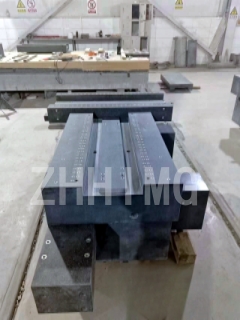PCB drilling and milling machines are essential tools used in the manufacturing of printed circuit boards (PCBs). These machines employ rotary cutting tools that remove material from the PCB substrate using high-speed rotational movements. To ensure that these machines operate smoothly and efficiently, it is essential to have stable and robust machine components, such as the granite used for the machine bed and supporting structure.
Granite is a popular material used in the construction of PCB drill and milling machines. This natural stone has excellent mechanical and thermal properties that make it an ideal material for manufacturing machine components. In particular, granite offers high stiffness, high strength, low thermal expansion, and excellent stability. These properties ensure that the machine remains stable and vibration-free during operation, leading to increased accuracy and efficiency.
The impact of granite components on the overall dynamic stability of PCB drilling and milling machines can be evaluated through various means. One of the most common methods used is finite element analysis (FEA). FEA is a modeling technique that involves dividing the machine and its components into smaller, more manageable elements, which are then analyzed using sophisticated computer algorithms. This process helps evaluate the dynamic behavior of the machine and predicts how it will perform under various loading conditions.
Through FEA, the impact of granite components on the machine's stability, vibration, and resonance can be accurately evaluated. The stiffness and strength of granite ensure that the machine remains stable under various operating conditions, and the low thermal expansion ensures that the machine's accuracy is maintained over a broad temperature range. Furthermore, the vibration-damping properties of granite significantly reduce the machine's vibration levels, leading to improved efficiency and accuracy.
In addition to FEA, physical testing can also be conducted to evaluate the impact of granite components on the overall dynamic stability of PCB drilling and milling machines. These tests involve subjecting the machine to various vibration and loading conditions and measuring its response. The results obtained can be used to fine-tune the machine and make any necessary adjustments to improve its stability and performance.
In conclusion, granite components play a vital role in enhancing the overall dynamic stability of PCB drilling and milling machines. They offer excellent mechanical and thermal properties that ensure the machine remains stable and vibration-free during operation, leading to improved efficiency and accuracy. Through FEA and physical testing, the impact of granite components on the machine's stability and performance can be evaluated accurately, ensuring that the machine operates at optimal levels.
Post time: Mar-18-2024

